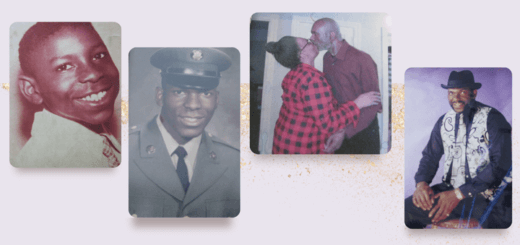From silence to support: One woman’s fight against the stigma of Alzheimer’s
Twenty years ago, Ann Silver didn’t know anything about Alzheimer’s disease and had never met anyone living with it. After her mother, Melba, was diagnosed, Ann was asked not to tell anyone. Melba died in 2004 from lung cancer, with most people unaware of her Alzheimer’s diagnosis. Now, Ann hopes that by sharing her own story she will help alleviate the stigma and hopes others learn about the disease and the resources available to all caregivers, particularly those in Northern Nevada.
A powerhouse
At 5 foot 2 inches tall, Melba Silver was a powerhouse of a woman. The mother of four children, Melba earned a master’s degree in education from State University of New York after graduating from Cornell University. She was a lifelong learner and spent time as a reporter and wrote editorials and news pieces for her local newspaper.
She dedicated her life to caring for the underserved and served as the head of the City of Rye, New York’s Planning Commission, President of the Westchester League of Women Voters, President of the Rye Library Board and helped to start an alternative high school for youth where she taught literature, poetry, and political science. In her later years after relocating to Florida, she was President of the Boca Raton Philharmonic and the local chapter of Planned Parenthood.
Melba died in 2004. There were more than 300 people at her memorial that included life-long friends, former students, colleagues, and other community members she had worked with on nonprofit causes. “There were people we’d never met before,” said Ann Silver, her daughter. “Various people said, ‘Oh your mom changed my life,’ or ‘I was inspired by your mom”, or “she was so civic-minded” or “she did so much for the public library.
“I grew up with the mom I wanted to be. She was the backbone of our family, strict, but never without cause, kind to everyone including all of our friends, and the first to laugh at all of our jokes. She was a great dancer and had a lovely singing voice and musical talents. She was the life of every party she either held or attended. All of her kids admired and loved her deeply and they lost both a mom and dear friend when she died.
“I now follow many of my mother’s hobbies. In many ways I’m trying to emulate her because she was amazing. Everyone complained about their moms when I was a teenager, but I couldn’t wait to talk to my mother. Even my friends confided in my mom. My mom was the most intelligent, accomplished, and gregarious woman her kids have ever known. She passed before she could fully appreciate her grandchildren and their many similar traits.”
Missing the signs
In the early 80s, Melba, now divorced, was living alone in Florida. She had a solid group of friends and community organizations she assisted and maintained an extremely busy schedule that included tennis, golf, and yoga. Her children lived all over the country and while they visited on holidays, only one of her sons, Erik, who lived nearby, saw her regularly.
However, Melba began noticing she had become forgetful. After she died, Ann found notes in her mom’s diary that noted Melba had missed meetings, didn’t know what day it was and thought she was repeating herself when she socialized with others. Close friends remembered Melba would miss meetings or forget a weekly tennis group. At one point, Melba took herself to her doctor who, unknown to her children, prescribed her Aricept® a known treatment for symptoms related to dementia.
Despite all this, Melba never said anything to her family. “All of her kids thought something was off, but not in a way that we fully understood,” said Ann, “She was fiercely independent. You’d be on the phone and she’d ask the same question twice, but say she didn’t hear you the first time. She had mechanisms for hiding her forgetfulness and was mindful not to let anyone catch on”.
A known diagnosis
In 2003, Ann traveled to visit her mother in Boca Raton, FL and instantly recognized something about her mother was different. At the time, Ann was still living in New York and told her mother to come for a visit. Prior to that, Ann had arranged for her mother to visit a doctor at Cornell-Weill hospital to take a memory test. Melba was reluctant but Ann was persuasive.
Melba was smart enough to fool the doctors on all of the memory questions except she couldn’t correctly draw a clock. Following the exam, the doctor met with Melba and Ann and indicated she might be in the early stages of Alzheimer’s but wanted to check again in three months. Melba asked Ann not to say anything to the rest of the family.
When Melba returned three months later, she was unable to answer any of the questions. This doctor also prescribed Aricept®. Melba told Ann she didn’t like the way Aricept® made her feel and that she wouldn’t be taking it, regardless of doctor’s orders. This was when it finally came out that Melba had known for over a year that she had late-stage dementia, but had never shared this with her family.
Unable to find her way home
Melba’s disease progressed quickly. In late 2003, on the way back home from a concert, Melba no longer knew how to drive home. She pulled over and dialed Ann’s number asking for directions. After contacting a friend to pick Melba up, claiming her car broke down, Ann immediately booked a flight from her new home in Nevada to Florida where she and Erik talked about what was going on. Erik had noticed things but was too close in proximity and saw her daily, so he’d missed the more dramatic changes in Melba’s behavior.
That same year, during a family Christmas gathering, everyone noticed Melba was coughing a great deal. After her eldest son and ex-husband went with her to the hospital, Melba was diagnosed with stage-four lung cancer. She died three months later.
“She went from the strong and amazing mother we knew to dying from cancer (with Alzheimer’s) in a few short months,” said Ann. “This remarkable woman, admired by so many, passed quietly at home, not fully aware of what was going on.” The lung cancer was brief but her children and their father knew that Melba had been silent for at least two years as her own personality and activities diminished in plain sight.
Combating stigma
In March 2004, when Melba died, the diseases of Alzheimer’s wasn’t publicly discussed. The stigma around Alzheimer’s still exists, in part, due to the lack of public awareness and understanding of the disease, and this was true for Melba. While her immediate family had eventually figured it out, it wasn’t something they told anyone. Alzheimer’s or any kind of dementia wasn’t even mentioned in her obituary.
Today, Ann is the CEO of the Reno + Sparks Chamber of Commerce. It was through this job that she became familiar with the Alzheimer’s Association®, a Chamber member, and began working with Niki Rubarth, regional director, Northern Nevada.
“Speaking with Niki was the first time I told someone about my mom having lived with Alzheimer’s,” said Ann. “The organization provides a safe place to discuss the disease and its impact on the individual and families without judgement. Just kindness and empathy.”
The Alzheimer’s Association is an active participant with the Chamber and representatives consistently attend our events and share their educational information and resources with our members. The Association helps those who are worried about their parents or other family members and friends and can answer questions about the progress of the disease, the anticipated changes in personality and what to expect. There can’t be enough education on caregiving or training.
“Twenty years ago, I had no idea what to do. Had my mother not died in three months from lung cancer, more friends and colleagues would have ultimately known [that] Melba was no longer the strong and confident woman they’d interacted with. The diagnosis would have remained a family secret. Now, things are different. Looking back on Melba’s determination to maintain secrecy and pride, her children would have reached out for help, intervention, and resources much sooner and been at her side throughout her hidden journey.”
Contact the Alzheimer’s Association
Currently, in the United States, Alzheimer’s is the 5th leading cause of death among people over the age of 65. In Nevada more than 10% of older adults have the disease. One in three older Americans dies with Alzheimer’s or another dementia. It kills more than breast cancer and prostate cancer combined.
Ann has known many friends and coworkers who have a loved one with the disease. Today she encourages others not to keep it to themselves like she and her family did. Instead, she urges people to contact the local Alzheimer’s Association.
“[When my mother was diagnosed,] I’d never met anyone who had Alzheimer’s,” said Ann. I knew it existed, but I didn’t know anybody [who had it]. Meet with someone and talk about caregiving. Talk about if you’re going to [be the caregiver] or if someone will help you do it. [If your] parent or spouse can stay in the home, what are the dangers? [Learn everything] I should have known at the time.
“Thinking of my mom, as the first born, I got extra time with her. She was just the greatest thing, and I miss her every single day. I carry around a picture of her in my wallet and think wow I pulled a lucky straw. I’m just very fortunate.”
For more information on the Alzheimer’s Association visit alz.org. For caregiver resources visit alz.org/caregiving.




















